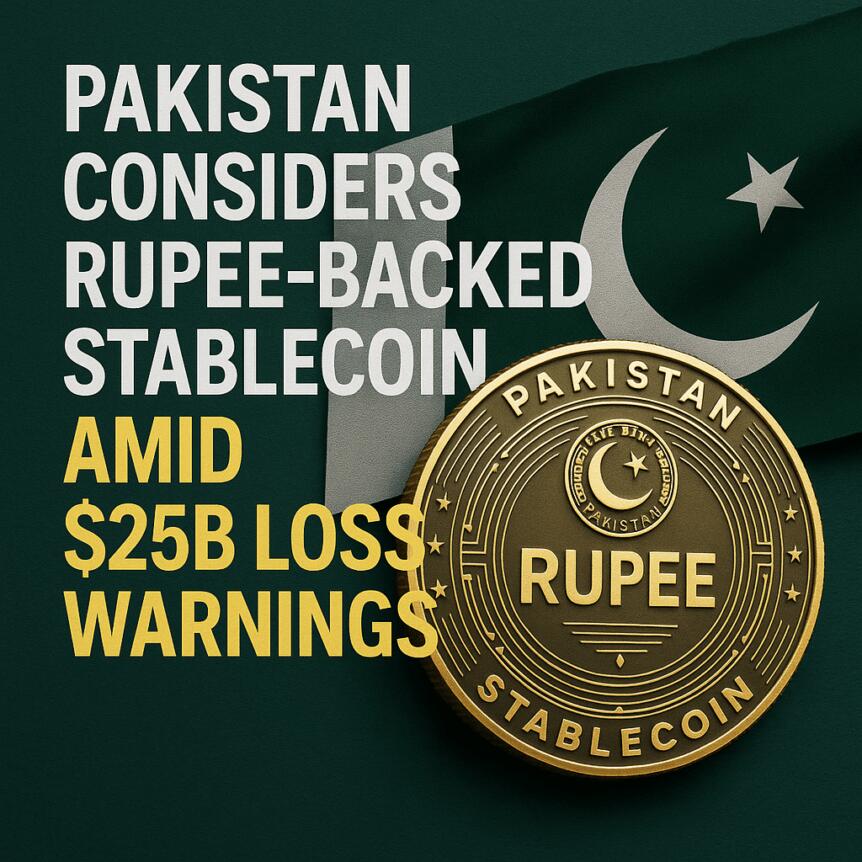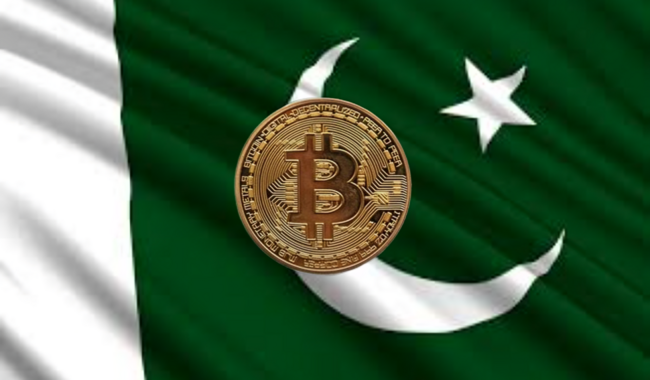Pakistan Considers Rupee-Backed Stablecoin Amid $25B Loss Warnings

Pakistani regulators are actively exploring the development of a sovereign-backed digital currency amid growing recognition of the transformative potential of cryptocurrencies and blockchain technology. Experts warn that delays in establishing clear regulations could result in significant economic losses, possibly up to $25 billion, by missing out on the global boom in stablecoins and digital assets.
- Pakistan considers launching a rupee-backed stablecoin to unlock billions in crypto-driven growth.
- The central bank is developing a CBDC, supported by the World Bank and IMF, with a pilot phase imminent.
- Fintech startup ZAR raises nearly $13 million to expand stablecoin access among Pakistan’s unbanked population.
- Pakistan’s crypto market ranks third globally, highlighting rapid adoption and market potential.
- The country invites international crypto firms to obtain licenses under new regulatory frameworks.
Pakistan is making strides toward integrating digital currencies into its financial system, aiming to harness the benefits of blockchain technology for economic growth. The country’s financial regulators are strongly considering the launch of a rupee-backed stablecoin, a move that could tap into an estimated $20–$25 billion in digital asset opportunities. This initiative comes as local industry leaders emphasize the need for robust regulation to prevent missing out on the booming global stablecoin and DeFi markets.
At a recent conference organized by the Sustainable Development Policy Institute (SDPI), Zafar Masud, President of the Pakistan Banks Association, highlighted that the global stablecoin ecosystem is rapidly expanding. He said Pakistan is “seriously considering a rupee-backed stablecoin,” which could facilitate easier cross-border remittances and extend financial inclusion. Faisal Mazhar, Deputy Director of Payments at the State Bank of Pakistan, revealed that a Central Bank Digital Currency (CBDC) prototype is already underway with technical assistance from the World Bank and IMF, with a pilot planned before full deployment.
ZAR’s Stablecoin Commitments to Financial Inclusion
Pakistan’s ambition to embrace stablecoins builds on the recent success of ZAR, a fintech startup dedicated to providing dollar-backed stablecoins to unbanked and underbanked populations. Having recently raised $12.9 million in funding led by Andreessen Horowitz, ZAR aims to bridge Pakistan’s significant financial exclusion gap through accessible digital assets. With over 100 million adults in Pakistan remaining unbanked, such initiatives could significantly enhance financial inclusion and economic participation.
Cointelegraph reports that Pakistan has climbed to third place globally in the Chainalysis 2025 Global Crypto Adoption Index, reflecting the country’s rapid uptake of cryptocurrency and blockchain solutions. This momentum further underscores the market’s potential for development and investment.
Pakistan ranks third in global crypto adoption. Source: Bilal Bin SaqibPakistan Launches Licensing for Crypto Firms
As part of its efforts to foster a regulated digital asset environment, Pakistan opened its markets to international crypto exchanges earlier this year. The Pakistan Virtual Asset Regulatory Authority (PVARA), established under the Virtual Assets Ordinance 2025, issued invitations to global firms to apply for licenses. PVARA’s roles encompass licensing, supervising, and regulating virtual asset service providers (VASPs), signaling the country’s commitment to integrating cryptocurrency into its financial ecosystem responsibly.
This regulatory push aims to attract reputable international players and ensure that Pakistan’s crypto sector develops within a framework that emphasizes security and transparency, ultimately bolstering investor confidence and safeguarding user interests in the evolving blockchain landscape.
This article was originally published as Pakistan Considers Rupee-Backed Stablecoin Amid $25B Loss Warnings on Crypto Breaking News – your trusted source for crypto news, Bitcoin news, and blockchain updates.
You May Also Like

Pakistan Considers Digital Rupee to Tap $25B Crypto Growth
Highlights: Pakistan is considering a digital rupee and CBDC to cut remittance costs. The crypto market in Pakistan could unlock $25B in new economic growth. The CBDC pilot phase is in development with World Bank and IMF support. Pakistan is moving forward with plans to integrate blockchain technology into its financial system. The nation is considering introducing a rupee-backed stablecoin and central bank digital currency (CBDC). The objectives of these efforts are to reduce remittance costs, modernize access to finances, and promote economic growth. At the Sustainable Development Policy Institute (SDPI) Conference, leading financial authorities outlined the massive growth potential of crypto. They estimate Pakistanis holding up to $30 billion in crypto holdings. The annual crypto trading might soon reach $300 billion, which is nearly equivalent to the total GDP of the country. Zafar Masud, the president of the Pakistan Banks Association, pointed out the booming global stablecoin market. According to him, the nation is capable of exploiting $20-25 billion in the adoption of digital assets. He confirmed that Pakistan is “actively exploring a rupee-backed stablecoin” to increase access and efficiency. A digital rupee would enhance secure cross-border payment and financial inclusion. More than 100 million Pakistani adults are still unbanked, and the innovation is a pressing case. Pakistan Considers Rupee-Backed Stablecoin Amid $25B Loss Warnings Pakistani regulators are actively exploring the development of a sovereign-backed digital currency amid growing recognition of the transformative potential of cryptocurrencies and bloc…https://t.co/CVr2s8UeoU pic.twitter.com/Fma8WTIGP3 — Crypto Breaking News (@CryptoBreakNews) November 8, 2025 CBDC Prototype Underway The State Bank of Pakistan is proceeding with the development of its digital currency. Faisal Mazhar, the Deputy Director of Payments, revealed that a prototype of CBDC is underway. Additionally, the World Bank and International Monetary Fund are assisting this initiative. He further added that there would be a pilot phase before the full rollout of the currency. The CBDC is expected to make remittances cheaper and financial services more accessible across the country. According to the global specialist Yara Wu, such technology would make remittances faster, secure, and cheaper. Sajid Amin of SDPI emphasized the necessity of having proper regulation. He noted the relevance of cybersecurity, digital literacy, and risk management to safeguard consumers and investors. Fintech Innovation Fuels Growth The fintech industry in Pakistan is also on the rise. ZAR, a start-up that provides dollar-backed stablecoins, recently raised $12.9 million. Top investors, such as Andreessen Horowitz, Coinbase Ventures, and Dragonfly Capital, were the source of funding. ZAR has raised $12.9 million to bring ROCK. SOLID. DOLLARS. to the Global South Led by @a16zcrypto, with @dragonfly_xyz, @vaneck_us, @cbVentures, and Endeavor Catalyst. pic.twitter.com/0DKOlWMwSO — ZAR (@zardotapp) October 28, 2025 ZAR is dedicated to making stablecoins accessible to underserved populations in Pakistan. Their mission focuses on bridging the financial gap in emerging markets. Moreover, the firm is seeking to assist millions of people who have yet to access traditional banking services. In addition, this move matches government-led digital finance initiatives. The increased adoption is a positive sign of increasing cryptocurrency interest in Pakistan. Pakistan moved to the third position globally in the 2025 Global Crypto Adoption Index by Chainalysis. To build further on this momentum, Pakistan established a regulatory framework regarding virtual asset services. Licensing and supervision are being managed by the Pakistan Virtual Asset Regulatory Authority (PVARA). Firms have to comply with stringent compliance criteria under the Virtual Assets Ordinance 2025. These include the anti-money laundering (AML), know-your-customer (KYC), and counter-terrorism financing measures. This goal is to create a regulated, safe digital economy. Furthermore, PVARA also encouraged international crypto exchanges and service providers to apply for licenses in September. eToro Platform Best Crypto Exchange Over 90 top cryptos to trade Regulated by top-tier entities User-friendly trading app 30+ million users 9.9 Visit eToro eToro is a multi-asset investment platform. The value of your investments may go up or down. Your capital is at risk. Don’t invest unless you’re prepared to lose all the money you invest. This is a high-risk investment, and you should not expect to be protected if something goes wrong.

Microsoft Corp. $MSFT blue box area offers a buying opportunity

